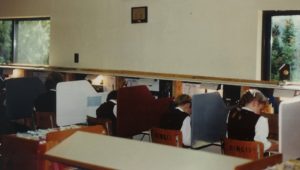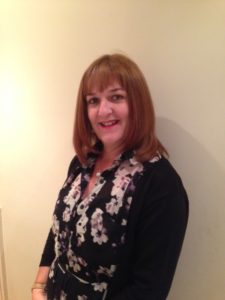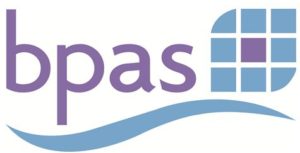“Everybody that was in the school was from the church. Everybody I met was from the church”

I went to an Accelerated Christian Education (ACE) school from when I was nine until I was fourteen. My parents were deeply religious, so when their church decided to open a school, I, along with my sister and seven other kids, were put into this experiment. The church and the school were blurred into one institution.
I had been bullied a lot at junior school because I was a soft target. The ACE school seemed like a safer environment to start off with, but it became apparent quite quickly that I was really contained within this structure that I couldn’t escape from. Everybody that was in the school was from the church. Everybody I met was from the church. I became frustrated very quickly because you were so closely monitored.
I was punished for asking questions. I really didn’t buy their creationism. When I was 11 or 12, I started to see holes in their argument. Everyone was so fervent in their beliefs, that this was the only way. As a kid, you think ‘Why are you so entranced with it that you’re unwilling to look at other things?’ I started asking questions about dinosaurs and Noah’s Flood.
The church actually brought in an American creationist preacher, a Ken Ham type, trying to fight science with ‘science’. For me that was the final nail in the coffin.
One morning I just went ‘I don’t believe this’, and at that point they started coming down on me really heavily. In a small school, if you’ve got one kid that’s really rattling the pot, they try and close you down and shut you up. Back then, because it was a private school, corporal punishment was legal, and my parents had agreed to it. You’d get the ruler if you were in too much trouble. Every week without fail, I got the ruler, either on the palm of my hand or on my backside. I got numb to it. It was just part of the process of going to school.
The church actually brought in an American creationist preacher, a Ken Ham type, trying to fight science with ‘science’. For me that was the final nail in the coffin. I was like ‘Nah, this guy’s talking guff as well’. They told us humans and dinosaurs were wandering about at the same time. When I asked questions they told me that the reason we find fossils on mountains is because the Flood put them there. A few times I even heard the old argument that the devil put dinosaur bones in the ground. The Piltdown Man hoax was brought up a lot. Even as a kid I was thinking: Yeah, but the scientists put their fingers up and went ‘We made a mistake with that one. Sorry about that’. Sometimes they just said this was God’s Word and I shouldn’t question it.
My mum volunteered in the school, so if I got in trouble with a teacher it would always feed back to my parents. It was a combination of the school ramming what they wanted down my throat and then when I get home my parents ramming their agenda down my throat. I said one thing out of line in a lesson, and I’d get it in the neck from the teacher and then I’d get it in the neck from my parents when I got back. I spent most of my school life in detention.
One morning I just went ‘I don’t believe this’, and at that point they started coming down on me really heavily.
I was just getting angrier and angrier, especially as I hit my teenage years. I was still getting picked on because I didn’t fit into the system. I remember praying to get the flu so I wouldn’t have to go to school.
There was definitely favouritism—the more pious you were, the better you did. Those who were more ‘godly’ were given special privileges, and they’re the kids now that have become leaders in their own churches and missionaries. We had a merit system, and at the end of the week the pastor would take the kids with the most merits to get an ice cream sundae or something. I think I managed that once.
For two or three hours a week, I’d watch services where my parents were speaking in tongues and falling over. They conducted exorcisms and all sorts. It was like mass hysteria. They were normal people until you put them all in a room together and threw in a couple of Bibles, and they’d all just go crazy. I show people videos of stuff like that now, and they can’t believe I was ever part of it. As soon as I hit ten or twelve, I backed away. My parents compared me to the kids that did better in the school. They’d tell me ‘They’re doing it. Why don’t you do that?’ I was like ‘I’m not them. I don’t believe that. I’m not gonna be the person you want me to be.’
When I left, the transition to a normal school was the worst thing ever. The church had told my parents that I would fall in with the wrong crowd and end up getting up to no good. I did exactly as they prophesied. I got labelled by the church. They’d say ‘We’ll pray for him. He’ll end up getting in trouble because he is the way he is’. My parents thought it was down to the devil. Nobody looked in the mirror and thought maybe we’ve put a foot wrong here. It was just because I didn’t believe.
Going to the school affected my life for a very long time afterwards.
It wasn’t until I met my long-time partner that I realised how much it had affected me. As you progress through a relationship, issues come up. As a teenager I was a party animal. I liked to drink and take a lot of drugs. I wasn’t really angry or aggressive, I just blanked stuff out. As I progressed into my mid-twenties, my anger issues were affecting my relationships, so I put myself through counselling. It wasn’t until the second or third load that I got down to the nitty-gritty of the church, the effect the containment had had on me, the inability to escape the confines of it. I was unaware that it had had that much of a negative effect on my life until I spoke about it openly. Now I understand where it’s come from I can turn it into something positive. For a long time it weighed me down.
The thing that affected me was the feeling of being constantly judged. As a kid, I didn’t feel like I fitted in. It wasn’t for me. You were constantly being judged by everyone within the church. They were always praying for you, always trying to get you to participate in the services and stuff like that.
Going to the school affected my life for a very long time afterwards. In hindsight, you look back on it and think it’s crazy. But getting through it has definitely made me a stronger person.
Anonymous




